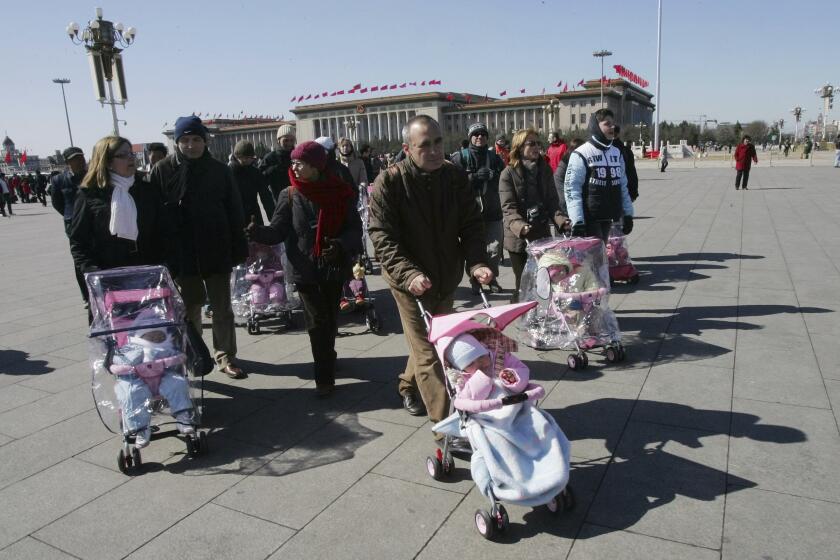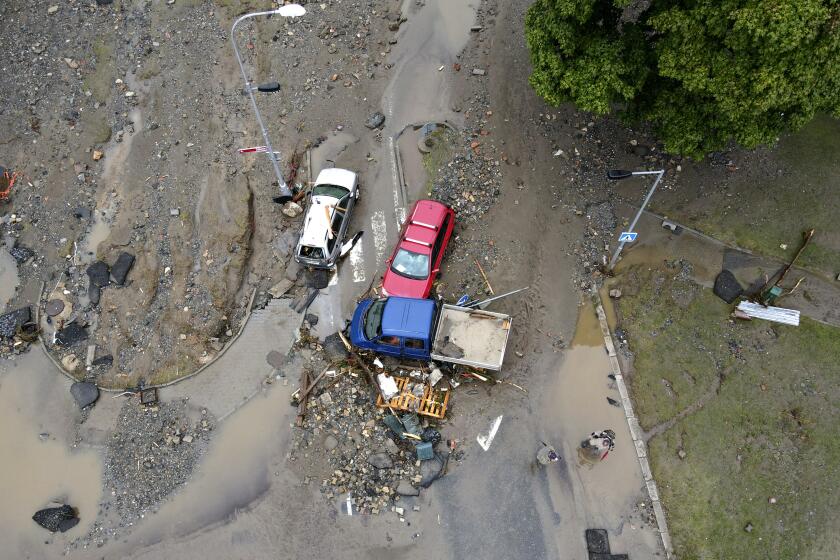Iraq Conflict Disrupts U.S. Plans for Military
The prolonged war in Iraq has frustrated Bush administration efforts to modernize the U.S. military and has complicated plans to reposition troops from long-established bases around the world.
The pressing need for manpower in Iraq has delayed the shift of troops from Germany to the United States and drove the Pentagon to announce last week that it would move troops off the Korean peninsula to Iraq.
“The Iraq war is a vortex that is ripping apart the American armed forces and it is ripping up the ground forces,” said Donald Abenheim, a professor at the Pentagon-run Naval Postgraduate School.
“The problem the leadership has is that it has this grand strategic plan that involves moving chess pieces around the globe. But its strategy does not seem to be working very well,” he said.
Bush administration officials have been trying since their first days in office to take a cold-eyed look at changing security needs brought about by the close of the Cold War and advances in military technology.
Although it is too soon to know how severe the problem will be, U.S. officials acknowledged that the need to replenish forces in Iraq and keep troop numbers above 135,000 was affecting long-range planning. Observers in the defense establishment have begun questioning whether the strategic review can remain relevant in the face of the continuing conflict.
The Bush administration has not abandoned plans to revamp its global defense posture, but major pieces of the review have been buffeted by the mission in Iraq. The need to find replacements for battle-weary soldiers is delaying the repositioning of troops in Europe while accelerating the same goal on the Korean peninsula.
And although the Iraq war hastened a withdrawal of troops from South Korea, it also limited the administration’s choices. Some of those 12,500 troops are being sent to Iraq, foreclosing the option of sending them elsewhere or paring overall troop numbers, outside experts say.
Over the past month, the U.S. has announced two historic movements of troops out of South Korea, a shift that had been considered unthinkable for decades because of the North Korean threat. But with at least 3,500 troops -- and possibly more -- heading directly to Iraq from their bases in South Korea, anticipated opposition to the move has been muted.
In Germany, however, a cherished goal of Defense Secretary Donald H. Rumsfeld -- to move the Army’s two fighting divisions from garrisons there to smaller bases to be built throughout Eastern Europe, where the troops would be closer to potential trouble spots -- is on hold because of the burdens the Iraq conflict has put on an already stretched Army.
One of the German-based divisions, the 1st Armored, already has been sent to join the fight in Iraq. Moreover, 14,000 members of the division have been ordered to remain, after a year of service there and dozens of casualties. Air Force Gen. Richard B. Myers, chairman of the Joint Chiefs of Staff, has said it was not out of the question that the 1st Armored would be asked to remain in the fight still longer, although other military officials expect the division to leave Iraq next month.
Because of the length of the deployment, the strain it has placed on soldiers’ families and the larger constraints of the war in Iraq, defense officials say the idea of rotating the 1st Armored into and out of bases in Eastern Europe for short tours without the soldiers’ families will have to wait.
At the Pentagon this week, senior administration officials working for the last 18 months on an assessment of troop numbers and deployments confirmed that in addition to the proposal to pull the two Army divisions from Germany, there are plans to reposition Navy command staff from London to Naples, Italy.
But the plan to build a string of training sites and bare-bones bases in Eastern Europe to make it easier to deploy forces to the Middle East, Central Asia and other potential hot spots has hit a snag. And with bases in the U.S. unprepared to handle the housing and training needs of the more than 30,000 soldiers who make up the two divisions, any move from their current stations in Germany could be a decade away.
In Asia, in contrast, the demands of the Iraq war appear to be greasing the wheels of Rumsfeld’s plan to shift forces from the Korean peninsula.
“In Korea, the crisis in Iraq is helping Pentagon planners make a move that Rumsfeld wanted anyway but wasn’t able to convince the world to accept,” said Michael E. O’Hanlon, a senior research fellow at the Brookings Institution.
“If they hadn’t had this need in Iraq, they might have had a problem convincing the Army and the administration to do this, because it’s counterintuitive at the very time we have a crisis on the Korean peninsula, to draw down forces.”
Instead, O’Hanlon said, “the fact that we really do need forces in Iraq right now sort of trumps the coordination that we would normally do.”
The pullout from South Korea could end up being largely offset by a buildup of U.S. forces elsewhere in the Pacific -- specifically in Guam, where Pentagon officials envision stationing more aircraft and submarines, and in Hawaii, where an aircraft carrier may be relocated from the U.S. mainland. About 25,000 troops will remain in South Korea.
The re-basing plan is premised on the calculation that, with the demise of the Soviet Union and the emergence of sophisticated military aircraft and other defense technologies, it would be more efficient for the military to withdraw ground troops from South Korea, Japan and Germany and establish skeletal bases in Eastern Europe and the Central Asian republics that could serve as staging areas in the event of a crisis.
By that reckoning, long-range bombers, unmanned aerial vehicles and sophisticated computer systems would provide better security than would permanent garrisons of ground forces abroad.
There is concern, however, that paring the U.S. military presence abroad could undercut American diplomatic influence and add pressure on the military budget at a time when it is already strained.
A study last month by the Congressional Budget Office found that any significant shifts in forces overseas would require substantial spending. It estimated that although annual savings could exceed $1 billion, the net up-front investment to resettle U.S. troops “would be substantial -- on the order of $7 billion.” The study concluded that the redeployments “would produce at best only small improvements in the United States’ ability to respond to far-flung conflicts.”
To deploy troops “from the likely locations of new bases would not be significantly faster than deploying them from current bases,” the agency said.
Against that backdrop, the effect of the Iraq war on the global basing strategy is potentially dire. The war, defense officials say, forced them to accelerate the process of withdrawing troops from South Korea. But it has also prevented them from proposing to cut those forces.
“We can go through this Global Posture Review, we can say we need to move troops out of all these various areas around the globe because we don’t face threats nearby, but as long as we are in Iraq, you can’t take the logical next step, which is to say that if these troops are not needed, they are not needed, and to pare down the military,” said Charles V. Pena, director of defense policy studies at the Cato Institute, a libertarian Washington think tank.
“Iraq forces us to keep things rather than to get rid of things, so all you are doing is moving chess pieces with no apparent end.”
A senior defense official involved in the review of forces acknowledged last week that Iraq has the potential to throw some of the long-range planning out of whack.
“I would say that Iraq specifically, and exactly what the endgame there is, is a piece of the puzzle that has not totally been defined,” the official told reporters. “And we’ll just have to see how that evolves and what security situation evolves there.”
But he defended the long-term plan.
“We’re in a different century now,” he said. “Things are different in the way military can bring capability to bear.”
More to Read
Sign up for Essential California
The most important California stories and recommendations in your inbox every morning.
You may occasionally receive promotional content from the Los Angeles Times.










